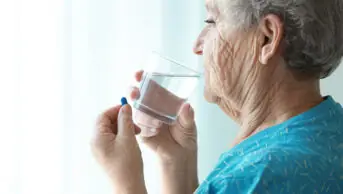Antimicrobial resistance (AMR) is one of today’s great public health challenges and it is driven by the use of antibiotics. As antimicrobial pharmacists and pharmacy technicians, we are tasked with reducing unnecessary antibiotic use in our patient population at Cwm Taf University Health Board, South Wales, which provides healthcare services to almost 300,000 people living in Merthyr Tydfil and Rhondda Cynon Taf. Like many health organisations, we face the particular challenge of an ageing population and a poor health legacy left by historical heavy industry.
Following discussions with local GPs about antibiotic prescribing, it is apparent that patient expectations of receiving an antibiotic is a major factor in GPs’ decision to prescribe. This phenomenon is well documented in the literature, with patient expectation and GPs’ perception of patient expectation among the strongest predictors of antibiotic prescription[1]
. Therefore, a novel approach was adopted to influence patients’ antibiotic expectations for self-limiting infections. An educational session was designed to dispel myths regarding antibiotics and their use; the work was based on the success of a previous local flu campaign that used the approach of dispelling ‘myths’ and ‘misconceptions’.
In June 2017, the team began a nine-month pilot of delivering ‘antibiotic myth-busting’ sessions to local community groups. The project was supported by funding from Public Health Wales. The education session aimed to dispel common myths around antimicrobial use, which were identified in a study conducted by the Wellcome Trust[2]
. The session was delivered with the aid of a PowerPoint presentation delivered by a pharmacy technician, in which the essential messages included not taking antibiotics for self-limiting viral infections, understanding antibiotic resistance and signposting patients to community pharmacy common aliments schemes.
The session also included an interactive element in which attendees were asked to participate in a ‘true or false’ paddle game[2]
. Participants were also asked to complete a before-and-after questionnaire, which used dyad- and triad-style questions to assess self-reported changes in knowledge and behaviour.
In total, the sessions were delivered to 625 people in 48 different community groups, although not all participants completed the before-and-after questionnaire. The most significant impact of the session was the improvement in people’s understanding of antibiotic resistance. A common misconception among participants was that it was a person’s own body that becomes resistant to antibiotics when too many antibiotics are taken, rather than the bacteria becoming resistant. Following the session, 82% (n=428/524) of people said they would feel confident explaining what antibiotic resistance is to a friend, compared with 24% of people (n=128/536) before the session.
People reported being less likely to take antibiotics for a cough or cold following the session; 88% (n=472/536) reported that they would ‘never’ take antibiotics, compared with 64% (n=337/524) before the session. Most people (77%, n=414/536) already knew that using antibiotics all the time can be harmful prior to attending the session. This increased to 84% (n=441/524) after the session, although 16% remained unconvinced of the associated harms.
Participants were presented with two scenarios in the form of triad questions to assess potential changes in behaviour. When presented with the scenario ‘Your friend has had a nasty cold’, there was a shift in people’s response from recommending the friend to see the GP, to consulting with a community pharmacist, or looking after themselves at home. Likewise, in response to the scenario ‘Your nephew/grandchild is studying hard for their exams, but has a sore throat making it difficult to concentrate’, people were less likely to advise them to attend A&E and more likely to advise getting throat sweets from their community pharmacy.
Explaining antibiotic resistance and its consequences to the general public can be challenging and misconceptions are common. While most people who attended our sessions had heard of AMR, few had a clear understanding. This project demonstrated that when AMR is explained and people are given the opportunity to respond and ask questions, understanding of AMR among the general public can be improved.
Most people who attended the sessions already knew that antibiotics should not be taken for coughs and colds and that taking antibiotics all the time can be harmful. We found this surprising; it was assumed that a lack of knowledge was driving patients to seek unnecessary antibiotics. Further work is needed to understand why people still seek antibiotics for self-limiting infections when they know antibiotics are not needed. Alternatively, we need to consider whether we targeted the right demographic. Future work will involve undertaking focus groups with those who have attended the sessions to explore these findings further.
Amy John, antimicrobial pharmacy technician, Cwm Taf University Health Board, Wales
Daniel Phillips, antimicrobial pharmacist, Cwm Taf University Health Board, Wales
Gabriella Booth, antimicrobial pharmacist, Cwm Taf University Health Board, Wales
David McRae, clinical pharmacist, Cwm Taf University Health Board, Wales
References
[1] Cals JW, Boumans D, Lardinois RJ et al. Public beliefs on antibiotics and respiratory tract infections: an internet-based questionnaire study. Br J Gen Pract 2007;57(545):942–947. doi: 10.3399/096016407782605027
[2] Wellcome Trust. Understanding of antibiotics: What are people’s experiences and behaviours with antibiotics, and what do they know about them? Wellcome Trust Monitor Wave 3. Available at: https://wellcome.ac.uk/sites/default/files/antibiotic-resistance-graphic-wellcome-apr16.pdf (accessed August 2018)
